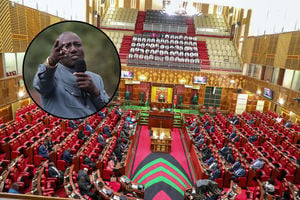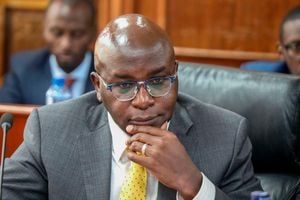
National Treasury and Economic Planning Cabinet Secretary John Mbadi.
National Treasury Cabinet Secretary John Mbadi has zeroed in on a five-point plan to put money into the pockets of Kenyans, especially the middle class, which he says is the biggest engine of the economy and whose current diminished purchasing power due to high taxes and expensive loans will hurt the country in the long run.
Mr Mbadi, in an interview with Nation, said the Treasury is considering a reduction of the Pay As You Earn (PAYE); lowering of bank interest rates; timely payment of multibillion pending bills; expanding of manufacturing and value addition industry to create more jobs; and a review of the tax and tax collection regime to ensure equity.
Since President William Ruto came to power in September 2022, salaried Kenyans have felt the most pinch, with a survey by the Federation of Kenya Employers showing the deductions have now gone as high as 55 per cent, a historic-level high.
This is due to enhanced National Social Security Fund (NSSF) contributions, the raising of national health insurance deductions to 2.75 per cent of gross salary, up from a Sh1,700 cap, and the introduction of an affordable housing levy at 1.5 per cent of an employee’s salary, with no cap.
These deductions have already stretched the payslips of most Kenyans with the majority of workers taking home less than two-thirds of their pay, which violates the law that says a deductions should not be more than two-thirds of one’s basic pay.
Already, the government has breached this law with over 17,132 of its own employees earning less than one-third of their basic pay.
This has already put Mr Mbadi at loggerheads with Parliament as he is expected to appear before the Public Accounts Committee (PAC) to explain their variance.
Mr Mbadi told Nation that the reduction of PAYE, though gradual, will help ease the burden, with the current highest rate at 35 per cent for those earning Sh500,000 and above.
“This move may not be immediate but we are looking at it and in the next one or two years, it will be implemented,” Mr Mbadi said.
In Homa Bay on Friday, he promised: “I am making the changes needed. Give me one year — and I will make sure there is more money in your pocket because that is how we grow.”
Asked specifically about the kind of reductions Kenyans should expect, Mr Mbadi was non-committal.
“I still don’t want to be specific on the reductions,” Mr Mbadi said.
Coupled with this planned reduction of PAYE, Mr Mbadi said, is ensuring the availability of cheap and accessible loans.
“The interest rates is something that we must lower to make sure the middle class can access credit facilities at affordable rates that do not further strain their pockets,” Mr Mbadi said.
He went on: “The lowering of interest rates will also ensure that small businesses which are mostly owned by the middle class can also access credit in banks to boost the economy.”
Mr Mbadi did not give a definite figure on reduction saying it is still a work in progress with all stakeholders being engaged to ensure the government comes up with a workable figure accepted by all parties involved.
The CS was, however, categorical that the government will not cap the interest rate through a law saying such a move will be counterproductive as was seen in President Uhuru Kenyatta’s administration.
“We cannot cap the interest rates as it distorts the economy and would hurt more. We will instead use both monetary and fiscal consolidation strategy to that effect,” Mr Mbadi said.
An attempt by former Gem MP Joe Donde to cap the rates 24 years ago failed when banks went to court and successfully managed to reverse the move.
Another attempt by Jakoyo Midiwo in 2015 to cap the interest rates also flopped on technicalities after the Budget and Appropriations Committee then chaired by Mbere South MP Mutava Musyimi said the proposed amendments went against Article 114 of the Constitution, which requires MPs proposing laws altering key money matters to consult National Treasury.
The National Assembly in 2015 passed a Bill by Kiambu MP Jude Njomo capping interest rates at 14.5 per cent from 18 per cent that was charged by most banks while others were charging as high as 24 per cent.
In President Uhuru Kenyatta’s second term, in 2019, MPs proposed to delete the interest rates cap in the Finance Bill of that year.
Pending bills
Mr Mbadi’s third plank in his plan is to ensure the timely payment of pending bills to suppliers and contractors in both the national and county government, now estimated to be Sh664.7 billion.
The move, according to Mr Mbadi, will ensure that there is enough money in circulation and reduce the strain on fully depending on payslip for everything, especially for the working class.
According to the plan, small and medium businesses having contracts with the government will be paid once in the first quarter of the financial year upon verification of the amount owed while payment to multinationals will be spread in two financial years.
“Small and medium businesses such as those who supply stationery, those in the construction industry, and those doing renovations and maintenance are mostly owned by the middle class, so when you delay their payments, you affect their payslips and liquidity. This is a trend that we intend to stop,” Mr Mbadi said.
He said the Pending Bills Verification Committee, chaired by former Auditor General Edward Ouko and which was formed to scrutinise and analyse the existing pending bills, has taken inordinately long but is almost finalising its report.
“They asked for an extension to March which I granted and said it is the final one. They are making good progress though,” Mr Mbadi said.
While Mr Mbadi regretted that the government came in at a difficult time with a lot of loans to pay after the previous regime went on a borrowing spree, he said the prompt payment of suppliers in both levels will start as early as next.
“We have started with the roads sector and as early as next year, these programmes will be rolled out,” Mr Mbadi said.
Mr Mbadi also said the timely release of money owed to devolved units will also be a key enabler in lessening the burden of the payslip saying most people do business with the county government and when payment is delayed, it affects their liquidity.
Governors have threatened to shut down operations in the 47 counties due to delays in giving them cash, even as the National Treasury says its disbursements are up to date.
Value addition
For those without jobs, Mr Mbadi says the government is focused on value addition in the manufacturing sector in order to create more employment for Kenyans.
In this plan, Mr Mbadi argues that when more people are absorbed in the employment sector, it reduces the dependency ratio on those already working hence reducing the burden on the payslip of the middle class who have many unemployed relatives to support.
“For instance, when you have two people depending on your payslip, it means you will be strained financially. Our plan is to ensure, we employ these two so that the middle class can have an extra income in their pockets,” Mr Mbadi said.
The Treasury boss is also seeking to introduce major reforms in the tax collection system to ramp up resources for the government without necessarily introducing more taxes to the taxpayers.
During a recent President Ruto’s tour in the Nyanza region, Mr Mbadi urged the Head of State to give him at least one year in a bid to reform the tax collection system.
“Your Excellency, we thank you for the new task. But I just want to ask you and fellow Kenyans to give us at least one year to reform the tax collection system,”
Mr Mbadi said the reforms he envisaged at the helm would instil austerity measures and help revamp the economy.
Mr Mbadi is however facing an uphill task on how he will push through the next taxes after the deadly protests that led to the rejection of the Finance Bill, 2024
The environment on the introduction of new taxes has further been poisoned politically following the impeachment of former Deputy President Rigathi Gachagua.
Currently, the National Assembly finance and planning committee is conducting public participation in the Tax Laws (Amendment) Bill, 2024 which seeks to raise at least Sh136 billion drawn from reforms such as the extension of tax amnesty, high excise taxes for alcohol and cigarettes and data services.
The World Bank has already warned that the Kenya Kwanza administration will face difficulties in introducing new taxes calling for broad changes by the government.











